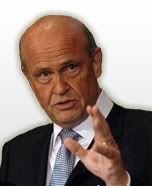Fred Thompson, 'mole' for Nixon White House

 On the official Web site for his anticipated presidential run, former U.S. Sen. Fred Thompson (R-Tenn.) says that during the Watergate hearings he "gained national attention for leading the line of inquiry that revealed the audio-taping system in the White House Oval Office." A former assistant U.S. attorney in Tennessee, Thompson served as minority counsel to the Senate Watergate Committee.
On the official Web site for his anticipated presidential run, former U.S. Sen. Fred Thompson (R-Tenn.) says that during the Watergate hearings he "gained national attention for leading the line of inquiry that revealed the audio-taping system in the White House Oval Office." A former assistant U.S. attorney in Tennessee, Thompson served as minority counsel to the Senate Watergate Committee.
But a story published in yesterday's Boston Globe reveals details about his role in the Watergate probe that suggests Thompson was something other than the good-government crusader he now makes himself out to be. It begins:
The day before Senate Watergate Committee minority counsel Fred Thompson made the inquiry that launched him into the national spotlight -- asking an aide to President Nixon whether there was a White House taping system -- he telephoned Nixon's lawyer.
Thompson tipped off the White House that the committee knew about the taping system and would be making the information public. In his all-but-forgotten Watergate memoir, "At That Point in Time," Thompson said he acted with "no authority" in divulging the committee's knowledge of the tapes, which provided the evidence that led to Nixon's resignation. It was one of many Thompson leaks to the Nixon team, according to a former investigator for Democrats on the committee, Scott Armstrong , who remains upset at Thompson's actions.
"Thompson was a mole for the White House," Armstrong said in an interview. "Fred was working hammer and tong to defeat the investigation of finding out what happened to authorize Watergate and find out what the role of the president was."
In fact, it wasn't actually Thompson who first discovered Nixon was taping conversations, nor was he the first to question the Nixon White House about it, according to the Globe. The initial revelation occurred during a private session between congressional investigators and Nixon aide Alexander Butterfield in response to a question by Don Sanders, a Republican staffer. The Globe reports:
When Thompson learned of Butterfield's admission, he leaked the revelation to Nixon's counsel, J. Fred Buzhardt.
Thompson got to ask the question during the public session at the behest of Sen. Howard Baker (R-Tenn.), whose 1972 re-election campaign he had managed.
Understanding Thompson's role in the Nixon case, the Globe says, "helps put in perspective" his recent role as an outspoken advocate for pardoning Vice President Dick Cheney's former chief of staff, I. Lewis "Scooter" Libby, convicted earlier this year of obstructing justice in the investigation into who leaked a CIA operative's identity. Thompson also served as an advisor for the defense trust of Libby, whose sentence was controversially commuted earlier this week by President Bush.
Tags
Sue Sturgis
Sue is the former editorial director of Facing South and the Institute for Southern Studies.
